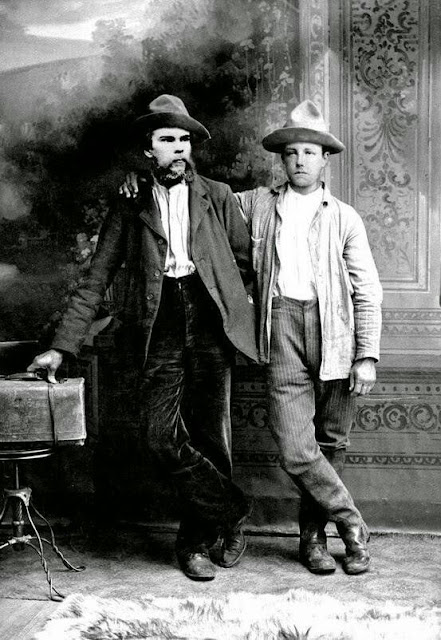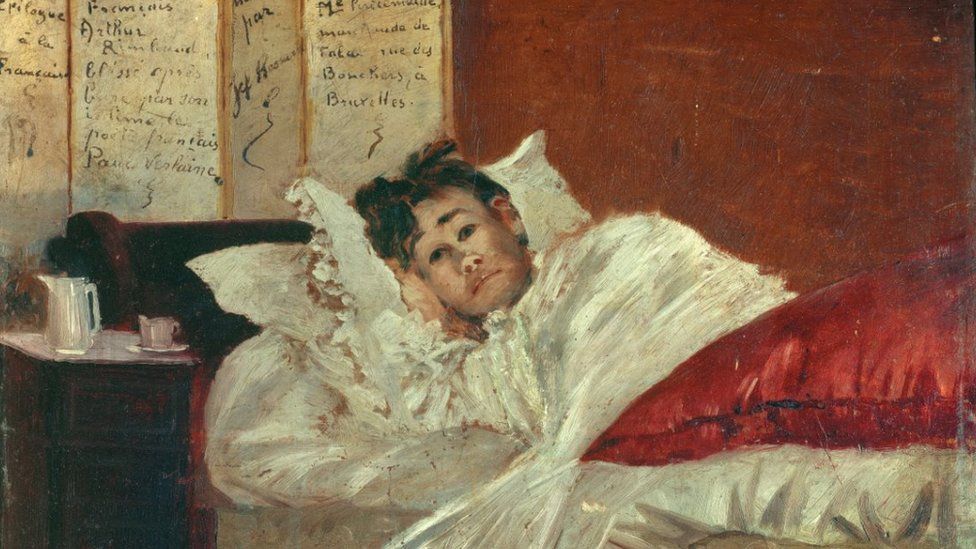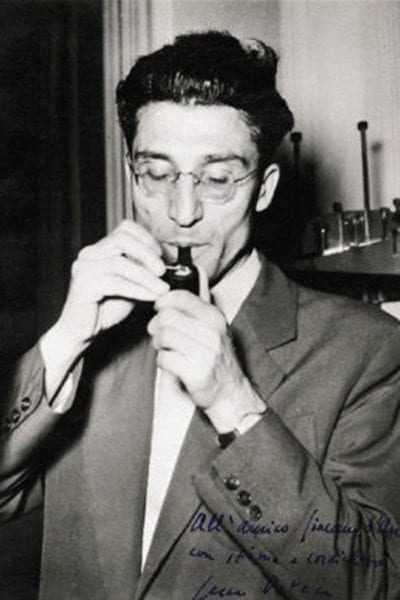“And then we cowards”
Cesare Pavese
Cesare Pavese

Passion for Solitude
Arthur Rimbaud

The Seekers of Lice
When the child’s forehead, cursed with furies, red blisters, pines for a forgetful swarm of pathetic dreams,
there steps to his bed two rangy, highborn sisters
—silver nails extended from refined, slender limbs.
They fix the child in a chair before a window
showing on the blue air that bathes fecund meadows;
they drive, through hair matted with sweat and morning dew, their charming, delicate fingers, cruel as new snow.
He hears their sibilance, their halting song, their breath thick with honey odor, vegetable, roseate,
broken here and there by their spittle’s sucked hisses, their plays for kisses thwarted, stillborn, celibate.
He hears black eyelashes flutter in the perfumed silence; their electric fingers craft paradise,
a half-drunk indolence, while through the humid room crackle the royal nails crushing the little lice.
But then: the wine of Sloth rises in him; the sigh of a harmonica bruises the azure sky.
The tympanic flows of their fingers catalyze, surging, dying, surging in him—the need to cry.
1870-1872
Arthur Rimbaud
Voyelles
A noir, E blanc, I rouge, U vert, O bleu: voyelles,
Je dirai quelque jour vos naissances latentes:A, noir corset velu des mouches éclatantes
Qui bombinent autour des puanteurs cruelles,
Golfes d'ombre; E, candeurs des vapeurs et des tentes,
Lances des glaciers fiers, rois blancs, frissons d'ombelles;
I, pourpres, sang craché, rire des lèvres belles
Dans la colère ou les ivresses pénitentes;
U, cycles, vibrements divins des mers virides,
Paix des pâtis semés d'animaux, paix des rides
Que l'alchimie imprime aux grands fronts studieux;
O, suprême Clairon plein des strideurs étranges,
Silences traversés des [Mondes et des Anges]:
—O l'Oméga, rayon violet de [Ses] Yeux!
Arthur Rimbaud
David Wojnarowicz.
Arthur Rimbaud in New York (1979)
To a Reason
A step of yours is the conscription of the new men and their marching orders.
You look away: the new love!
You look back,—the new love!
“Change our fates, shoot down the plagues, beginning with time,” the children sing to you. “Build wherever you can the substance of our fortunes and our wishes,” they beg you.
Arriving from always, you’ll go away everywhere.
Arthur Rimbaud

Vagabonds
He saw me as a loser, a weird child; he added his own prods.
I answered my satanic doctor, jeering, and made it out the window. All down a landscape crossed by unheard-of music, I spun my dreams of a nighttime wealth to come.
After that more or less healthy pastime, I’d stretch out on a pallet. And almost every night, soon as I slept, my poor brother would rise—dry mouth and bulging eyes (the way he’d dreamt himself!)—and haul me into the room, howling his stupid dream.
Truly convinced, I’d vowed to take him back to his primal state—child of the sun—and so we wandered, fed on wine from the caves and gypsy bread, me bound to find the place itself and the code.
J. S. Tennant after Rimbaud
The Sleeper in the Valley
After Rimbaud
You can hear the engine idling lazily
Through the knotted roadside hawthorn hedge
By the turn-off. The chassis fits snugly
Between fence and verge: its sun-bright wharfage.
A young man, head slung back, open mouthed,
Kips among the dog rose and cow parsley.
He lounges in the driver’s seat, shrouded
By spring from the sun on the barley.
His alloys couched in arum lilies, he sleeps;
A convalescent’s smile etched across his face.
Coddle him, gentle earth, his sleep is deep––
To you he will never repay his debt.
He sleeps in the shade, one hand on the wheel
And on the cracked windscreen his scalp, a red rosette.
Arthur Rimbaud
Le Dormeur du Val
C’est un trou de verdure où chante une rivière,
Accrochant follement aux herbes des haillons
D’argent ; où le soleil, de la montagne fière,
Luit : c’est un petit val qui mousse de rayons.
Un soldat jeune, bouche ouverte, tête nue,
Et la nuque baignant dans le frais cresson bleu,
Dort ; il est étendu dans l’herbe, sous la nue,
Pâle dans son lit vert où la lumière pleut.
Les pieds dans les glaïeuls, il dort. Souriant comme
Sourirait un enfant malade, il fait un somme :
Nature, berce-le chaudement : il a froid.
Les parfums ne font pas frissonner sa narine ;
Il dort dans le soleil, la main sur sa poitrine,
Tranquille. Il a deux trous rouges au côté droit.
The Sleeper in the Valley
It’s a green hole where a river sings
As it madly hangs onto the grass its rags
Of silver; where the sun, from the proud mountain,
Shines down: it’s a little valley bubbling with light.
A young soldier, open mouth, bare head,
And neck bathing in the sweet blue watercress,
Sleeps; he is stretched out among the grass, beneath the skies,
Pale in his green bed where the light rains down.
Feet in the gladiolas, he sleeps. Smiling like
An ill child would smile, he takes a nap:
Nature, cradle him in warmth: he is cold.
Fragrances don’t make his nostrils quiver:
He sleeps in the sun, one hand on his chest,
Motionless: he has two red holes in his right side.
Translated by Wallace Fowlie
Fernando Pessoa/Alvaro de Campos
I Got Off the Train I got off the train And said goodbye to the man I'd met. We'd been together for eighteen hours And had a pleas...
-
Paul Verlaine and Arthur Rimbau It rains in my heart As it rains on the town, What languor so dark That soaks to my heart? ...
-
Muff when you are digging in the wardrobe or in the dictionary and toward you it falls, you begin to think of cave bear and megaloceros, of...
-
The Bandage Translated from the Greek by Evan Jones He said that he'd stumbled into a wall or fallen. But likely the cut on his shoulder...




